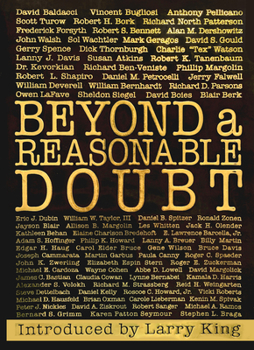Beyond a Reasonable Doubt
Select Format
Select Condition 
Book Overview
" Beyond a reasonable doubt" is heard countless times every day in courtrooms around the country. And yet the standard represented by this phrase is nowhere mentioned in the constitution. Nor is it defined anywhere in our laws. What, then, does it really mean? How can it be interpreted? In Beyond a Reasonable Doubt , more than 80 influential scholars, attorneys, novelists, journalists, and religious figures-- including Vice President Kamala Harris--...
Format:Hardcover
Language:English
ISBN:1597775037
ISBN13:9781597775038
Release Date:November 2006
Publisher:Phoenix Audio
Length:485 Pages
Weight:1.70 lbs.
Dimensions:1.4" x 6.0" x 9.0"
Customer Reviews
3 ratings
A great read while traveling.
Published by Thriftbooks.com User , 17 years ago
You can pick up this book and start reading at the beginning, middle or end. Whether you read it for five minutes or five hours it's enjoyable and provides valuable insights. Beyond a Reasonable Doubt, has many authors. They range from the famous to the infamous. From high-profile attorneys to everyday hoodlums. Together, they provide a fascinating compendium of what is required to prove a defendant guilty before a jury. A brief biography of each author is presented along with their opinion. Some positions reflect on years of careful thought and introspection. Other opinions are shot from the hip. The book deals with the criminal and the civil justice systems. A good case is made that the civil system is arbitrary because right and wrong have lost their meaning. Examples are provided for medical malpractice, business ethics and contracts. The state of the criminal justice system is more ambiguous. Strong arguments are made for both the equity and inequity of criminal justice. All of the information provided is valuable to anyone who may be called to jury duty. Selected information can be used to bolster just about any bias one may have regarding our justice system. The range of authors and the fact that they are kept to just a few hundred words, make for entertaining reading.
Beyond a Reasonable Doubt:Letteers and Essays from the famous and Infamous on the True and Legal Def
Published by Thriftbooks.com User , 17 years ago
Excellent, interesting and informative reading. Most of these essays/chapters are very thought provoking.
An interesting book about standards of innocence and guilt
Published by Thriftbooks.com User , 17 years ago
This book deals with a number of topics and has 85 contributors. An important topic is jury nullification. This is the case where a jury decides, quite legally, to let a guilty person go free. A jury can also intentionally convict an innocent person, but that can often be appealed. I'm against jury nullification. Many years ago, some students were unhappy about the fact that secret (and highly inaccurate) files were being kept on them by their university. They protested, but they could get nowhere because the existence of these files was denied! Finally, some of them broke into a dean's office, restrained the dean (that's a crime; it's called "kidnapping"), opened his file cabinet, and removed the secret files (that's also a crime). Although the criminals accomplished something positive by their crimes, I felt the criminals needed to be punished in accordance with the law. They weren't, and as a result, numerous destructive "copycat" crimes followed which did no one any good. Of course, in this country, jury nullification has an even more annoying aspect. In the case that I cited, the issue of "reasonable doubt" did not come up. But sometimes it does, such as in the OJ Simpson case. Here, "reasonable doubt" was used as an excuse for jury nullification. That makes me wonder about the entire idea of using juries as determiners of fact. I think if we want to allow a jury to let a guilty person go free, we should first make sure the accused is actually guilty! And that means letting some folks other than the nullifiers determine the facts. In this book, Philip Howard points out that the role of a jury is to inform the Court of the facts. Of course, he's right. And he is discussing the contrast with the role of the judge, which is to answer questions of law. But my point is that we won't have a justice system at all unless questions of fact are resolved, and that jury nullification forces us to skip this step. I was hoping to see more comments on this point in the book. Howard did at least make the point that we need to stop juries from making whimsical decisions on matters of law as well. The first section of the book deals with the concept of "reasonable doubt" specifically. Next is a section on "equal justice." And after that, there's a section called "quest for truth." There's plenty of interesting material here. But I wanted to see far more on ideas to get truth to play a much bigger role in our legal system. After all, without truth, there can't be justice! Some of the contributors did not mind the fact that OJ Simpson got away with murder, reasoning that a system that would convict him would also convict some innocent people. I think those contributors are totally wrong. OJ Simpson went free because the system was no good; I think such a bad system will generally convict more, not fewer, innocent people. There is also a section on the media and the justice system. And there's a section on protecting victi






